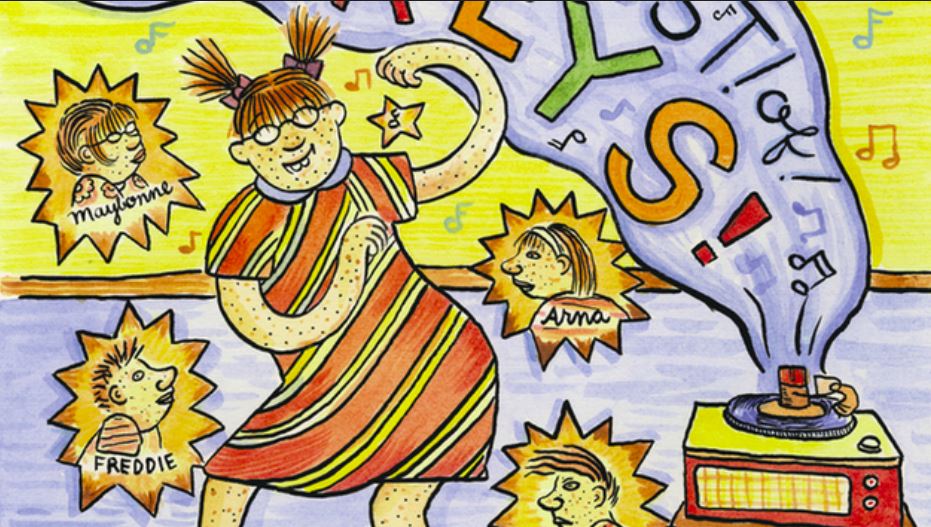by Ned Hayes for OLY ARTS
OLY ARTS reported in June that The Evergreen State College was cutting heavily into staff and facilities that made theater possible at Evergreen. The Experimental Theater (COM 124, a 200-seat, black-box venue) and its costume and scene shops will close at the end of the spring 2018 semester. Faculty and staff members have been informed that three of four staff positions and 20 student-staff positions are to be eliminated. There will also be cuts to the academic budget office, library staff and media-services office.
Evergreen is known for seeding the careers of nationally renowned artists, including musicians Carrie Brownstein, Corin Tucker, Julie Ruin, Seattle rapper Macklemore and Soundgarden co-founder Kim Thayli. Visual artists have also been nurtured by Evergreen, including Simpsons and Futurama creator Matt Groening and Ernie Pook creator Lynda Barry.
Although Macklemore’s office stated that he would not be commenting on the recent Evergreen cutbacks, nationally renowned artist Barry weighed in on the controversial cutbacks with fiery invective.
“STEM was the first sign of an oncoming form of cultural genocide,” said Barry to OLY ARTS. “[These actions] are taking out programs everywhere especially studio arts programs. It’s our thumbs getting together to decide to do away with our fingers.”

Barry is now considered one of America’s most beloved cartoonists. She began her career at Evergreen, submitting “bizarre, weird” comix to the Evergreen student newspaper when Simpsons creator Matt Groening was the editor.
“He made this announcement saying that he would print anything that anyone submitted,” she said. “I read that and I thought, ‘Really?’ And I tried to come up with stuff that he would not print.”
Her submissions were the beginning of a life-changing friendship with Groening.
Today, Barry stands up for creative expression at Evergreen and at other small liberal arts colleges across the country. She sees the recent cutbacks as part of a countrywide trend. “This is happening to small liberal arts colleges all over the country and it should be a national story,” said Barry.
Barry’s concern is borne out by factual evidence. According to the Association of American Educators, arts programs are in fact being cut unilaterally. In 2012, a Department of Education survey reported that arts education is suffering the most under recent planning budgets, particularly in high-need communities. The American Alliance of Museums has also recently raised alarms about additional cuts proposed by the current Presidential administration to the programs of the National Endowment for the Humanities (NEH) and the National Endowment for the Arts (NEA). In 2015, the National Endowment for the Humanities funded more than 800 projects with nearly $121 million in partial and full grants to programs. According to its annual report, 115 of those initiatives were classified as “Educational Programs,” receiving more than $13.8 million.
“You are into a larger story that hasn’t really made the news,” said Barry of the Evergreen cuts. “It really strikes me as a form of cultural genocide.”
“We have $5.9 million in cuts to make,” explains Zach Powers, communications manager for the college, “and the reduction to our Communication Building and some of our arts programs that work in that building make up $250 thousand of that.” In a year of “waning enrollment,” Powers emphasizes the need to prioritize funding for lower-cost programs that most directly affect students’ academic paths. “There [are] no curricular offerings being canceled as a result of these closures. … We’re trying to minimize the effects on students all over campus. … It’s not as though (the arts) are being singled out.”
“As the school was working on their fiscal challenges and drop in enrollment,” recalls Jerry Berebitsky, the facility’s current technical director, “they said, ‘Stuff will happen. People will lose jobs.’ We knew the arts are not often respected in the budget-cutting realm, and it’s something that’s easy to cut early.” The recital hall will remain open, but scheduling space for student-run arts organizations to perform will be increasingly difficult.
WHAT
Love/Sick
WHEN
7 p.m. Friday and Saturday, June 8 and 9
WHAT
INBETWEEN
WHEN
7:30 p.m. Friday and Saturday, June 8 and 9
WHAT
Samsara, Death and Rebirth
WHEN
8 p.m. Saturday, June 9
HOW MUCH
Free after $3 parking fee
WHERE
Communication Building (except Love/Sick, which is in Seminar D4107),
The Evergreen State College,
2700 Evergreen Pkwy. NW, Olympia
LEARN MORE
www.evergreen.edu/calendar
360-687-7444


This is bizarre. Cuts to faculty at Evergreen are not “cultural genocide,” but are due to declining enrollment in part because of the very bad publicity Evergreen has drawn because of bad behavior by some extreme students who took over the institution, and because of extraordinarily bad management by Evergreen executives. There are some fields of study at Evergreen worth saving; the College should be taken over and run by WSU, which could institute some management and behavior controls. The Legislature should act, instead of ignoring the troubles at Evergreen, which have wrecked its reputation. They should not continue to fund outrageous behavior, in which excellent faculty are forced out.
Ha! Cultural genocide? Give me a break. Welcome to reality, where cost/benefit and limited public resources must be allocated to maximize best use. Time to grow up. Beam me up Scotty. There’s no life on this campus.
This isn’t surprising. It’s fitting with the hostility that Karen Johnson and Shannon Stewart, the current administrative staff of the Communications Building, have towards supporting student work or even allowing students to access spaces. There’s a black-box theatre in that building that hasn’t been used for anything but classes since 2014. It’s ridiculous. Their behavior has deprived an entire generation of Evergreen students access to spaces their tuition pays for.